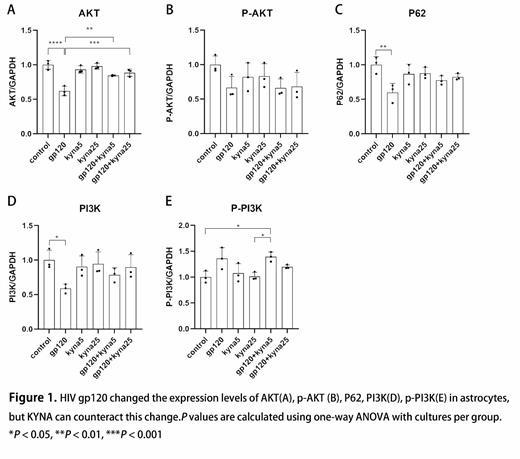Background
Since the introduction of combined antiretroviral therapy, acquired immunodeficiency syndrome (AIDS) caused by human immunodeficiency virus (HIV) has transformed from an incurable fatal disease to a chronic treatable disease. HIV-associated neurocognitive disorder (HAND) is a common long-term complication of AIDS. Astrocytes are believed to play an essential role in the development of HAND. Therefore this study aims to find out how astrocytes change and how to resist this change in the process of hand.
Methods
Cortical astrocytes were dissected from Sprague-Dawley (SD) neonatal rats (1-3 days) with the aseptic operation and digested with 0.25% trypsin 37℃ for 20 min. The cell suspension was dispersed through the cell strainer and seeded into the poly-D-lysine coated T-75 flasks supplemented with 10% FBS and 1% penicillin/streptomycin. After ten days of incubation, the cells were purified in a shaking incubator (250 r/min) at 37℃ for 24 h, and astrocytes were cultured at desired densities in 6-well plates. The cells were identified as >98% pure astrocytes by Cy3-conjugated GFAP immunostaining. Cultured astrocytes were treated with 150 pM HIV-1 gp120 CM for 12 h before applying 5 or 25 μM kynurenic acid(KYNA) for 12 h. Afterward, western blotting technology was used to detect the expression levels of different proteins in each group, and Fuji Image J software was used to analyze the bands.
Results
Compared with the control group, the expression levels of AKT, PI3K and P62 proteins in astrocyte of mice added with gp120 were significantly reduced, which were 38%, 41% and 40%, respectively, while KYNA alone had no significant change; Compared with the addition of gp120 group, the trend of decreased AKT (P<0.05) and PI3K protein expression was inhibited when both gp120 and KYNA were added, with an increase of 43% and 52%, respectively. We observed that the expression level of p-AKT had a similar trend but the expression level of p-PI3K had an opposite trend. This suggests that the effect of gp120 on the PI3K/AKT pathway may have begun with an upregulation of PI3K activation levels.
Conclusion
HIV-1 gp120 can cause changes in the physiological status of astrocytes, and KYNA can counteract this change, which indicates that KYNA may have a potential therapeutic effect on HAND. ( Acknowledgements:National Natural Science Foundation of China, No. 82172259 to H.C.; Undergraduate Training Program for Innovation and Entrepreneurship of SMU, China, No. 202212121247; Corresponding author: Hong Cao, gzhcao@smu.edu.cn )
Keywords:HIV-1 gp120, Kynurenic acid, Astrocyte, AKT, PI3K disorder
Disclosures
No relevant conflicts of interest to declare.


This feature is available to Subscribers Only
Sign In or Create an Account Close Modal